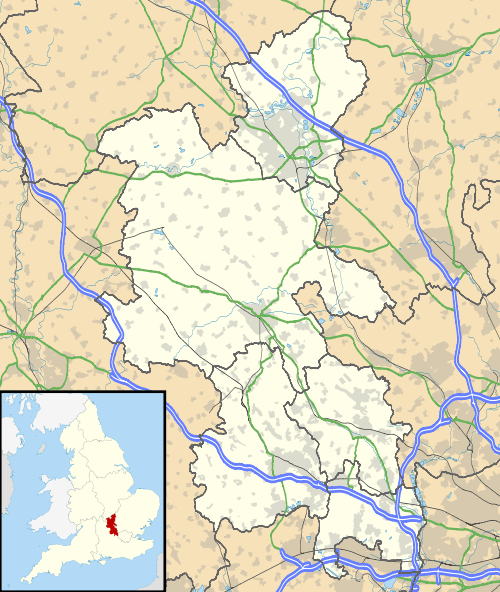Turweston Aerodrome
| Turweston Aerodrome | |||||||||||
|---|---|---|---|---|---|---|---|---|---|---|---|
| IATA: none – ICAO: EGBT | |||||||||||
| Summary | |||||||||||
| Airport type | Private | ||||||||||
| Operator | Turweston Flight Centre Ltd | ||||||||||
| Location | Turweston, Buckinghamshire | ||||||||||
| Elevation AMSL | 438 ft / 134 m | ||||||||||
| Coordinates | 52°02′27″N 001°05′52″W / 52.04083°N 1.09778°WCoordinates: 52°02′27″N 001°05′52″W / 52.04083°N 1.09778°W | ||||||||||
| Map | |||||||||||
 EGBT Location in Buckinghamshire | |||||||||||
| Runways | |||||||||||
| |||||||||||
Turweston Aerodrome (ICAO: EGBT) located near the village of Turweston, in north Buckinghamshire near the Northamptonshire border. It is a former Royal Air Force Second World War bomber training facility, now a business park and airfield.
Turweston Aerodrome has a CAA Ordinary Licence (Number P750) that allows flights for the public transport of passengers or for flying instruction as authorised by the licensee (Turweston Flight Centre Limited). The aerodrome is not licensed for night use.[2] The runway direction now commonly being used is 09/27.
Air Traffic Services are provided by Turweston Radio on 122.175 MHz.
RAF Turweston
Based on 220 acres (89 ha) of land in the north west corner of Buckinghamshire, just off the A43 road and located 2 nautical miles (3.7 km; 2.3 mi) east of the market town of Brackley, RAF Turweston served as a bomber training school during the Second World War. Opened on 23 November 1942 it had three concrete runways and one T1 hangar.[3] The three runways were:[4]
- 10/28 - 2,000 yd × 50 yd (1,829 m × 46 m)
- 04/22 - 1,400 yd × 50 yd (1,280 m × 46 m) (later extended to 1,750 yd (1,600 m))
- 16/34 - 1,400 yd × 50 yd (1,280 m × 46 m)
It initially housed the Vickers Wellingtons and Avro Ansons of No. 12 Operational Training Unit RAF until April 1943, when it began housing the North American Mitchells of No. 13 OTU. In May 1943 they were joined by the Douglas Bostons of No. 307 Ferry Training Unit RAF, with both units remaining until closure. No. 17 OTU Gunnery Flight began arriving in July 1943 with Wellingtons, and formed fully in November 1943 with a flight of Miles Martinets.
Other types located at Turweston included: Airspeed Oxford; Westland Lysander; de Havilland Mosquito and the Hawker Hurricane.
At the end of the Second World War, the RAF had a surplus of facilities, and many including Turweston were scheduled for closure. Turweston closed on 23 September 1945, but was retained by the Air Ministry. The land was used for private vehicle storage and agriculture.
In the 1950s, it was known as MTSSD TURWESTON, and was a sub-depot of COD Chilwell, housing the Army's stocks of Bren Gun Carriers. The maintenance staff consisted mainly of female civilians.
For some time prior to 1994 the airfield was in use as a gliding training airfield at weekends only. Turweston Aerodrome re-opened for business in 1994, having been rebuilt as a combined airfield, aero-club, flight school and rally track. The new conference facilities were opened in 2004, and the location has also served as a dance or rave venue,[5][6] including the Gatecrasher Summer Soundsystem festival in 2008 and 2009.
Until 2011, Turweston hosted an annual Wings & Wheels event, which in addition to aircraft, showcases vintage cars, motorbikes, tractors and farm machinery. Also run annually is the overland Fast-Track service into the British Grand Prix.
Accidents and Incidents
On 28 July 2016 G-MEPU, a private AutoGyro Europe MT-03 crashed and killed the pilot[7]

References
- ↑ Turweston - EGBT
- ↑ "Ordinary Licences and Boundary Maps P-T" (PDF). Civil Aviation Authority. Retrieved 13 January 2012.
- ↑ RAF Turweston Airfield
- ↑ http://www.aviationresearch.co.uk/ARAerodromes.htm#hname
- ↑ gurn.net
- ↑ Archived 26 September 2006 at the Wayback Machine.
- ↑ Ranter, Harro. "ASN Aircraft accident 28-JUL-2016 Rotorsport UK MT-03 G-MEPU". aviation-safety.net. Retrieved 2016-08-02.
External links
- Turweston Aerodrome website
- ControlTowers.co.uk history of RAF Turweston
- AviationResearch.co.uk, a site focusing on WW2 bomber training around Brackley
- DrivingAmbition.info, a site for under 17's wanting to drive at Turweston Aerodrome